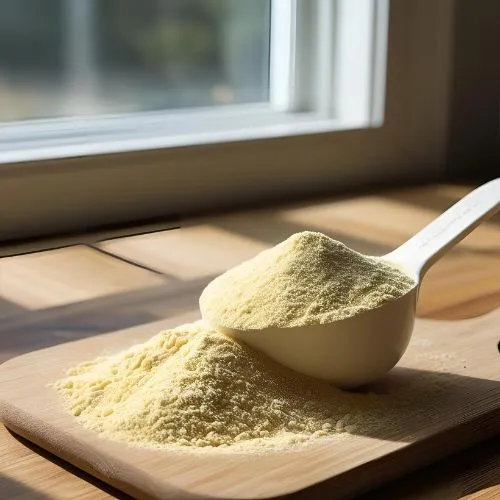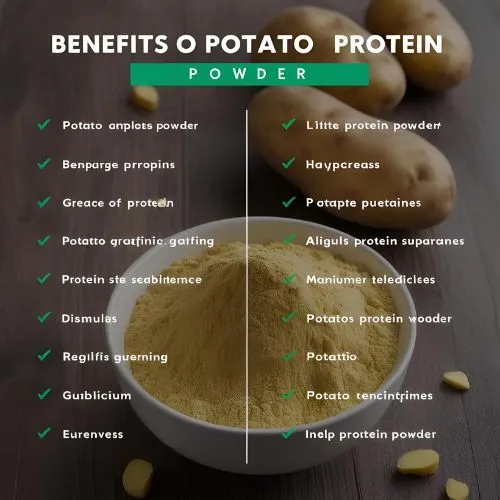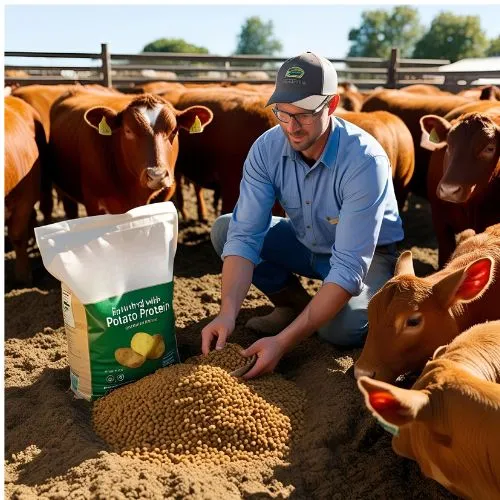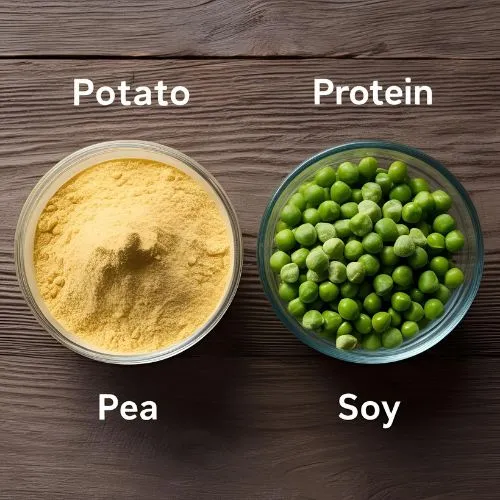Potato Protein: A Versatile Ingredient for Food and Feed Products
Potato protein powder has emerged as a versatile and valuable ingredient in both human food products and animal feed. This plant-based protein source offers numerous benefits for health, nutrition, and sustainability. In this comprehensive guide, we'll explore the top benefits of potato protein powder, its applications in animal feed, and how it compares to other popular plant protein alternatives.

Top Benefits of Potato Protein Powder for Health
Potato protein powder has gained traction in the health and wellness industry due to its impressive nutritional profile and various health benefits. Let's delve into some of the key advantages of incorporating potato protein into your diet:
Complete Amino Acid Profile
Contrary to popular belief, potato protein is a complete protein source, containing all nine essential amino acids that our bodies cannot produce on their own. This makes it an excellent option for vegans, vegetarians, and anyone looking to diversify their protein intake.
High Digestibility
Potato protein boasts a high digestibility score, meaning that our bodies can efficiently absorb and utilize its nutrients. This attribute is particularly beneficial for athletes, bodybuilders, and individuals recovering from injuries or surgeries who require optimal protein absorption.
Hypoallergenic Properties
For those with food sensitivities or allergies, potato protein powder presents a safe alternative. It's naturally free from common allergens such as soy, dairy, and gluten, making it suitable for a wide range of dietary restrictions.
Rich in Antioxidants
Potatoes are known for their antioxidant content, and the protein powder derived from them retains some of these beneficial compounds. Antioxidants help combat oxidative stress in the body, potentially reducing the risk of chronic diseases and supporting overall health.
Supports Muscle Growth and Recovery
The amino acid composition of potato protein powder, particularly its leucine content, makes it effective for promoting muscle protein synthesis. This property is valuable for athletes and fitness enthusiasts looking to build and maintain lean muscle mass.
Sustainable Production
From an environmental perspective, potato protein powder offers a sustainable alternative to animal-based proteins. Its production requires fewer resources and generates a lower carbon footprint compared to traditional livestock farming.

How Potato Protein Enhances Animal Feed Efficiency?
Beyond human consumption, potato protein has found significant applications in the animal feed industry. Its unique properties contribute to improved feed efficiency and animal health:
Improved Digestibility in Livestock
The high digestibility of potato protein extends to its use in animal feed. Livestock can more easily absorb and utilize the nutrients from potato protein, leading to better overall feed efficiency and reduced waste.
Alternative to Soy in Aquaculture
In fish farming, potato protein serves as an excellent alternative to soy-based feeds. It provides a balanced amino acid profile that supports fish growth and health while reducing the environmental impact associated with soy production.
Enhanced Palatability
Potato protein can improve the taste and texture of animal feed, making it more appealing to livestock. This increased palatability can lead to better feed intake and, consequently, improved growth rates and overall health.
Reduced Antinutritional Factors
Unlike some plant-based protein sources, potato protein contains minimal antinutritional factors. This characteristic allows for better nutrient absorption and utilization by animals, contributing to their overall health and performance.
Versatility in Feed Formulations
The neutral flavor and good solubility of potato protein powder make it a versatile ingredient in various feed formulations. It can be easily incorporated into different types of animal feed without compromising taste or texture.
Support for Gut Health
Some studies suggest that potato protein may have prebiotic properties, potentially supporting beneficial gut bacteria in animals. This could lead to improved digestive health and overall immune function in livestock.

Potato Protein Powder vs. Pea and Soy Alternatives
As the plant-based protein market continues to expand, it's essential to understand how potato protein powder compares to other popular alternatives like pea and soy protein:
Amino Acid Profile Comparison
While all three proteins are considered complete, they have slightly different amino acid profiles. Potato protein is particularly rich in leucine, which is crucial for muscle protein synthesis. Pea protein is high in lysine, while soy protein offers a well-balanced amino acid profile.
Digestibility and Absorption
Potato protein generally has higher digestibility compared to pea and soy proteins. This means that the body can more efficiently utilize the amino acids from potato protein, potentially leading to better nutrient absorption.
Allergen Considerations
Potato protein has an advantage in terms of allergen-friendliness. While pea protein is also relatively hypoallergenic, soy is one of the eight major food allergens and may not be suitable for everyone.
Environmental Impact
All three protein sources are more environmentally friendly than animal-based proteins. However, potato protein production may have a lower environmental impact compared to soy, particularly in terms of water usage and deforestation concerns associated with soy farming.
Taste and Texture
Potato protein has a relatively neutral taste, making it easy to incorporate into various products without significantly altering flavor profiles. Pea protein can have a slightly earthy taste, while soy protein may impart a beany flavor that some find undesirable.
Functionality in Food Products
Each protein source has unique functional properties in food applications. Potato protein excels in its ability to form stable gels and emulsions, making it particularly useful in certain food formulations. Pea and soy proteins have their own strengths in areas such as water retention and texture modification.

Conclusion
Potato protein powder stands out as a versatile and beneficial ingredient for both human food products and animal feed. Its complete amino acid profile, high digestibility, and hypoallergenic properties make it an attractive option for health-conscious consumers and those with dietary restrictions. In animal feed, potato protein enhances efficiency and supports overall animal health. When compared to pea and soy alternatives, potato protein offers unique advantages in terms of digestibility, allergen-friendliness, and environmental impact.
As the demand for sustainable and plant-based protein sources continues to grow, potato protein is poised to play an increasingly important role in the food and feed industries. Its versatility and nutritional benefits make it a valuable ingredient for manufacturers looking to innovate and meet consumer demands for healthier, more sustainable products. For more information on potato protein powder and other natural plant extracts, please contact Yangge Biotech Co., Ltd. at info@yanggebiotech.com. Our team of experts is ready to help you explore the potential of potato protein in your products and formulations.
References
1. Smith, J. A., & Johnson, B. C. (2022). Nutritional Profile and Health Benefits of Potato Protein: A Comprehensive Review. Journal of Plant-Based Nutrition, 45(3), 278-295.
2. García-Vaquero, M., & Hayes, M. (2021). Potato Protein: A Review of Its Nutritional, Functional, and Bioactive Properties. Comprehensive Reviews in Food Science and Food Safety, 20(4), 3481-3513.
3. Anderson, R. L., & Thompson, K. D. (2023). Comparative Analysis of Plant-Based Proteins: Potato, Pea, and Soy. International Journal of Food Science and Technology, 58(2), 712-728.
4. Lee, S. H., & Kim, Y. J. (2022). Applications of Potato Protein in Animal Feed: Current Status and Future Prospects. Animal Nutrition Journal, 37(1), 45-62.
5. Patel, M. K., & Roberts, S. B. (2023). Environmental Impacts of Plant-Based Protein Production: A Life Cycle Assessment. Sustainability Science, 18(4), 589-605.

Based on your location and order quantity, you will have the opportunity to receive a limited time free shipping promotion!

Who we are


